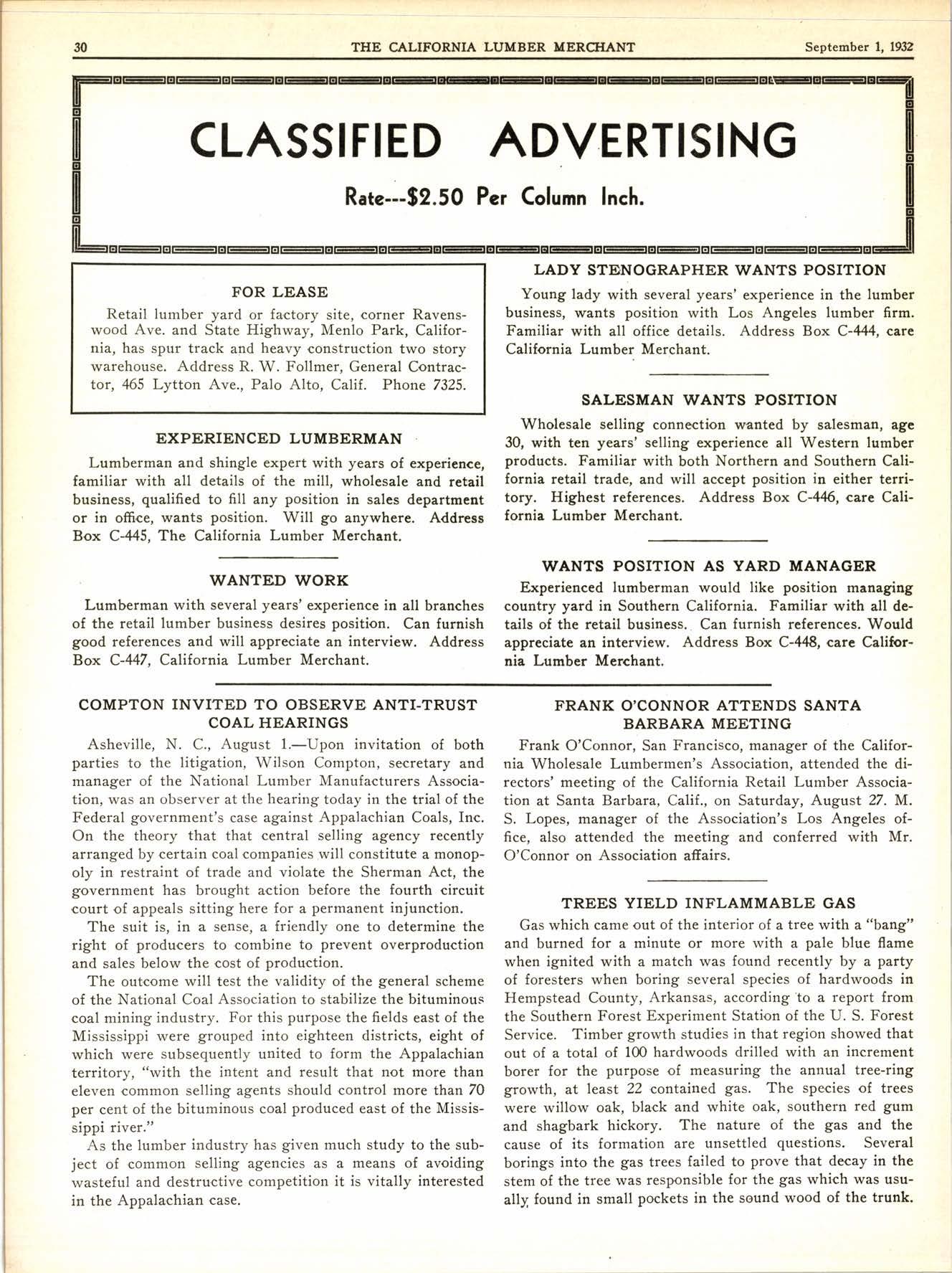
3 minute read
\Vest Coast Association to Carry on Yield Tax Study
Seattle, Washington, August ll.-Trustees of the West Coast Lumbermen's Association, in a meeting at Tacoma, during the week directed that a careful study be made.by the Association, in cooperation rvith other interested agencies, of the possibilities of some gradual and equitable application of the yield tax on commercial timber in the Douglas fir region.
This action.is in line with the recommendation of the United States Timber Conservation Board released last week to the public and with a condition long recognized in the northwest as one of the causes of over-production in lumber and instabilitv in the lumber industry.
In its instruction to the Association, the Board emphasized the serious difficulties in adopting the yield tax on commercial timber lands, due to the fact that any such undertaking must fairly provide for the usual revenue needs of timber counties and for the equities of other groups of tax-payers. The West Coast Lumbermen's Association will not recommend any application of a yield tax unless it is satisfied, after full study, that the particular application meets these requirements.
The Board believes the time is ripe for a thorough study of the possibilities of a yield tax for the follorving reasons:
1. Public recognition, through the Timber Conservation Board has been given to the fact, long known to lumbermen and county officials, that the prevailing tax system is a source of over-production in lumber and of financial demoralization rvithin the industry.
2. Over-production and demoralization bring rvith them wholesale unemployment and serious difficulties to lumber communities; and
3. Delinquency of timber taxes is also becoming a serious problem along the West Coast. The effect of non-tax payments by timber-owners on local revenues is not 1'et known but it will undoubtedly add to the difficult problem of how to conserve the public revenue from timber resources.
The West Coast Lumbermen's Association does not knorv that the yield tax system is the answer to the present and future economic problems of the industry in Washington and Oregon, but it does believe the yield tax system, in line with the recommendation of the Federal Timber Conservatlon Board, should be carefully examined. Perhaps the yield tax contains the answer.
The study will be undertaken immediately by the Association staff under the direction of Colonel W. B. Greeley, Secretary-Manager.
Following is a statement of the timber taxation situation in the United States and a recommendation for consideration by states of yield tax by the Timber Conservation Board.
Memorandum: Recommendation on "Taxation of Timber" made public by the Timber Conservation Board, Washington, D. C., August t, 1932. (This is one of several recommendations in the particular report.)
"The present and prospective annual burden of taxation on mature standing timber distinct from the land upon which it grows is the most important single present factor forcing the sale or cutting of timber without due regard to the current market demand for forest products. This condition is basic and its adverse effect cumulative. It is not a result of the general depression; nor will it be corrected by general economic recovery. Its economic importance varies widely between regions and between individual ownerships in each region. But it has becorne a controlling factor in a sufficient proportion of timber ownerships to efrect and to involve the entire range of forest products industries.
"The present and future security of private ownership of merchantable standing timber as well as the maintenance of reasonably current balance between production and consumption of forest products, requires the substitution, in the principal timber states, of an equitable system of income or yield taxation for the present prevailing system of property taxation.
"Forest taxation, as generally in effect in the United States, also constitutes a major obstacle to the practice of forestry on private lands in that it effectually discourages the methods of cutting and silvicultural and protective measures necessary to keep forest lands continually productive.
"It is not practicable or necessary that the Timber Conservation Board seek to formulate in detail the sound and practicable methods of taxation most desirable in each State or in each locality or under all circumstances. The Congress of the United States, recognizing the magnitude and seriousness of this problem, has provided for a thorough nationwide study of forest taxation principles and practicable methods of application by regions and under varying conditions. This study is now under way and nearing completion through the,Forest Taxation Inquiry of the U. S. Forest Service.
"Accordingly, it is recommended that the earnest consideration of the principal states be invited to the public need of such modification of present prevailing methods of timber taxation; that the Forest Service be urged to make available at the earliest practicable time the conclusions and recommendations resulting from its investigations in this critical economic problem; and that consideration be given to the possible desirability and the practicability of enlisting concerted State interest and securing concerted
(Continued on Page 19)










